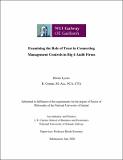| dc.description.abstract | Connections exist between management control (MC) practices in organisations whereby different types of controls are loosely coupled or interdependent (act as complements or substitutes) (e.g., Grabner and Moers, 2013; Bedford et al., 2016; Malmi et al., 2020). This study addresses calls in the literature to increase knowledge of MC connections by examining the role of trust in these connections, which has heretofore not been considered as a variable impacting on control connections. The context of this study is Big 4 audit firms, and the management control/trust relationship is first examined, followed by an examination of the role of trust in MC connections.
This research draws on the existing domain theory on MC connections (e.g., Bedford et al., 2016), the different perspectives on the control/trust relationship (e.g., Dekker, 2004; Mollering, 2005; Vosselman and van der Meer-Kooistra, 2009) and Sako's (1992) hierarchy of trust. It also draws on social exchange theory (Blau, 1964) as a method theory. A cross-sectional study of 42 semi-structured interviews with audit managers and seniors was conducted. The evidence of this study posits that management controls (MCs) act as complements and substitutes depending on the level of trust. Also, MCs are connected in their role as trust builders. These connections are intertwined with trust whereby MCs adapt to trust, and MCs enable different levels of trust to build as they present opportunities for information and social exchanges.
This study contributes to knowledge in three ways. Firstly, findings reveal the mediating role of social exchanges in the interactive relationship between management control and trust. Trust develops from contract trust to competence and goodwill trust as an outcome of the operation of individual MCs. As competence trust builds, organic MCs vary in their extent and frequency of use. In contrast, mechanistic MCs do not vary, but they lead to trust building. Secondly, my research unearths the important intermediary role trust plays in connecting MCs. Complementary and substitutive relationships can exist between the same and different pairs of trust, and this can depend on trust. Additionally, different degrees of interdependencies can exist between MCs. Thirdly, greater insights are achieved into use of MCs in audit firms. Social exchanges are a key aspect of control in the audit environment and trust plays an important role in the process of determining what controls are needed and ensuring controls are efficient from the perspective of avoiding over control. Finally, this study is the most in-depth study on trust in audit firms, thereby adding to knowledge of trust in a collaborative environment steeped in information asymmetries. | en_IE |


